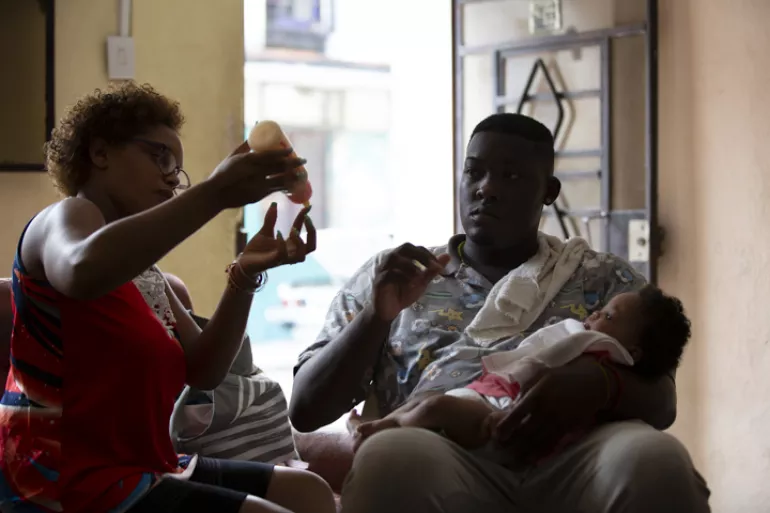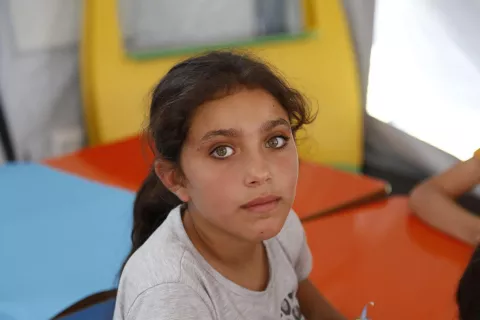UNICEF Cuba recognizes the harmony between the Draft of the Code of Families and the Convention on the Rights of the Child
UNICEF expresses the willingness and disposition to support the national authorities in implementing the Code that will be approved

- Available in:
- Español
- English
Havana, November 1st, 2021 – The United Nations Children’s Fund in Cuba (UNICEF Cuba) recognizes the process carried out by the country for the enactment of a Code of Families that will protect the rights of all people in their family contexts, with special attention given to the rights of children and adolescents (C&A).
The regulation, currently in its final stage, adopts international standards stipulated in the Convention on the Rights of the Child (CRC), which is an international instrument ratified by Cuba 30 years ago, and which recognizes that, for the full and well-balanced development of their personalities, children and adolescents must grow in the bosom of a family, in an environment of happiness, love and understanding.
It is highlighted that the draft takes very much into account the recommendations made to Cuba by the Committee on the Rights of the Child, the United Nations body tasked with ensuring compliance with the CRC. It also includes world commitment goals set in the Sustainable Development Goals, among which stand out ending all forms of violence against children and adolescents, as well as strengthening and promoting the social inclusion of all people, regardless of their age, gender, abilities or other conditions.
As a result, from UNICEF Cuba we recognize and value the advances of the Draft with regard to the following aspects:
- Inclusion of the best interest of the child as one of the governing principles in the applicability of the Code, the delimitation of elements to be taken into account for its assessment and determination, as well as the express regulation of its relevance in concrete matters. All this contributes to the observance of one of the recommendations made by the Committee on the Rights of the Child in the last periodical report by Cuba analyzed by this body.
- Recognition of relevant rights for children and adolescents within the family context, and the regulation of a wide set of rights that are exclusive of children and adolescents, consistent with the stipulations of the Convention on the Rights of the Child.
- With regard to the institutional spheres, it highlights the specialization requirement of the authorities and officials intervening in or settling family matters; the recognition of family mediation as an alternate method for the amicable resolution of conflicts, this being a flexible and friendly mechanism, advised for matters related to C&A; as well as the inclusion of family advocacy for children and adolescents, people with disabilities, the elderly and victims of violence.
- Transverse quality of prevention of and response to violence. The Draft not only recognizes the abuse of children and adolescents as family violence, but also regulates their urgent judicial tutelage. Of special note is the express prohibition of corporal punishment, which responds to another recommendation made by the Committee on the Rights of the Child. The protection of children from any kind of violence occupies a preeminent place in the Draft, which is a significant step against this phenomenon that constitutes a serious violation of the rights of C&A, has very harmful consequences on the physical, emotional, cognitive and social levels, and becomes a hindrance for the enjoyment of a full life.
- Relevance given to the right of participation of children and adolescents, both in the daily lives of families and in legal or administrative processes, which supports the conceiving of each child and adolescent as the subject of rights, an element already included in the Constitution of the Republic of 2019.
- Substitution of the institution of paternal authority for the notion of parental responsibility, which includes a detailed regulation of its content, including in digital environments, and which reflects the principles and rights recognized in the Convention on the Rights of the Child.
- Recognition of autonomy and progressive capacity and the modification of the regulation related to the legal representation of children and adolescents, which includes the possibility for them to carry out legal acts related to their inherent rights by themselves.
- It also highlights the inclusion of shared guardianship and care, the regulation of the right to communication with grandparents and other relatives by blood and marriage, the recognition of multi-parenting and a more complete and flexible regulation of adoption.
- Express regulation of the right of children and adolescents not to be separated from their parents and the exceptional nature of that separation when it occurs. On this point stands out the inclusion of elements related to the institutional protection in homes for children deprived of parental care, wherein is recognized their protective purpose, temporary nature, the duty to inform about the states of vulnerability and risk children and adolescents may be in, as well as the importance of retaining affective bonds with the original family.
- The regulation of fostering and substitute families, as these are arrangements promoting that children and adolescents deprived of parental care may grow up in family environments. This element also responds to one of the recommendations made to Cuba by the Committee on the Rights of the Child.
UNICEF expresses the willingness and disposition to support the national authorities in implementing the Code that will be approved, to work with families to avoid the appearance of risk factors, to strengthen family accompaniment and to work for a positive model of parenting. Likewise, we offer to promote jointly actions to raise awareness in society and train professionals, as well as to continue working for the empowerment and participation of children and adolescents.
UNICEF believes that families are a fundamental group in society and the natural environment for the growth and well-being of all of its members, and particularly of children and adolescents. Therefore, families must receive the necessary protection and assistance to take on fully their responsibilities within the community, as stated in the Preamble of the Convention on the Rights of the Child. We recognize that the analysis of the Draft by specialists and by the institutions tasked with its implementation will establish a solid instrument and that, should it become a law, Cuba would be taking a significant step in the protection of the rights of children and adolescents.
Media contacts
About UNICEF
UNICEF promotes the rights and wellbeing of every child, in everything we do. Together with our partners, we work in 190 countries and territories to translate that commitment into practical action, focusing special effort on reaching the most vulnerable and excluded children, to the benefit of all children, everywhere.
For more information about UNICEF and its work for children, visit www.unicef.org.




